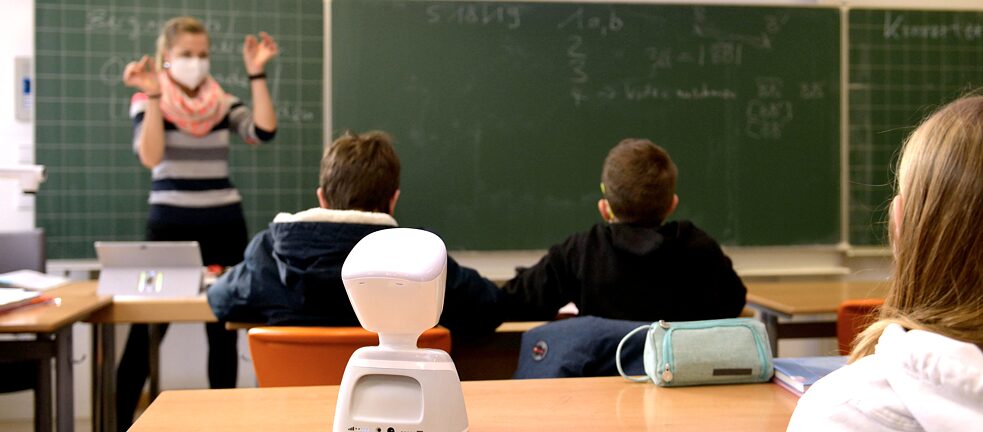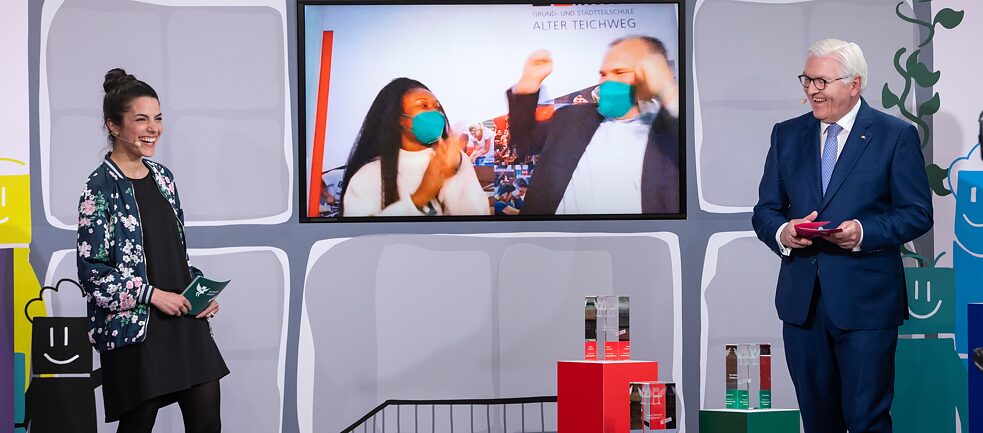Inclusion
“Good WiFi isn’t enough”

Education is happening in the digital space more and more. But what about students with disabilities? Anja Bensinger-Stolze is head of the Schools department at the Gewerkschaft für Erziehung und Wissenschaft (GEW; Union for Education and Science). She explains the situation regarding inclusion in digital education at German schools.
By Niko Kappel
Ms Bensinger-Stolze, what does digitally inclusive education mean to you?
For me it means that no child has to be at a disadvantage in digital lessons. Regardless of their social or cultural background, their gender, home situation or whether they have a disability.
What’s the situation regarding inclusion at German schools in the age of video calls and distance learning?
Inclusion overall is implemented differently from one Bundesland to another, and the concepts developed in individual schools vary. There are good concepts to ensure that students with disabilities don’t get left behind in digital lessons. But it isn’t possible to implement these concepts everywhere. One thing stands out: this can only work if all the boxes are ticked. A good media education concept, technology in the school building, trained education specialists, technology for the students, a stable internet connection for teachers and in the parental home, a supportive home environment, and plenty of time and patience.
So what exactly does digitally inclusive education involve?
You can only look at individual situations. It depends whether the child has a learning need or a physical disability. I’ll just give you an example: a student who is unable to move her arms usually dictates her written exams to an assistant in a face-to-face classroom scenario. That isn’t possible with home schooling. Technology can be useful here, for instance using a dictation app. But the technology needs to be made available to the learners first. Or at least good internet enabling them to use it.
So can the problem of inclusion in the digital education space be solved with new technology?
No, that’s not the only factor. Good WiFi isn’t enough, even though that’s a big problem. According to one of our studies, 50 per cent of schools in Germany still don’t have a WiFi network for their students. And while we’re on the subject of technology, the truth is that most of the devices provided to the teachers don’t have the necessary specification to actually handle all the tasks. For example in the Bundesländer and local authorities they often buy cheap laptops with inadequate storage, not enough applications and a screen that’s too small. For this reason they frequently resort to their own private devices instead. But there’s something that’s even more important: professional IT support. It’s not enough to allocate a colleague two hours a week to sort out the school PCs. We need new sources of support, properly trained personnel. Otherwise children with disabilities in particular don’t stand a chance in the digital education space.
So has digital education only really become an issue since the coronavirus pandemic?
No, absolutely not. But distance learning has increased the pressure on every school to continue developing the aspects of media education and technology. There was an ad hoc digitalisation spurt in schools during the coronavirus pandemic. Now the schools need to be supported in evaluating their experiences and channelling the good elements into a media concept. This might be through individual support or through provision of appropriate extra tuition. For instance I consider it ridiculous when people say, we’re going to spend the summer bringing socially disadvantaged children up to speed with the content they’ve missed. If a child can’t even keep up at school during the year, how are they supposed to catch that up in the holidays? So we need enough teachers who are properly trained with the time and skills to intercept children like this.
Do you know any schools in Germany where they are doing a good job of this?
In my view the district school “Alter Teichweg” in Hamburg is a good example of inclusive working. It’s networked with the community. It has won school awards and is an Olympic centre. This school incorporates much of what I would like to see in an inclusive school. The school has a comprehensive media concept, with top-of-the-range digital equipment and an emphasis on not leaving anyone behind because of their social background or a disability.
 Creative concepts in the coronavirus pandemic and inclusion even in the digital space – the “Alter Teichweg” primary and district school in Hamburg stood out particularly in these areas: Germany’s president Frank-Walter Steinmeier (r) and TV presenter Clarissa Correa da Silva (l) present the German School Award 20|21 Special in the category “Shaping Relationships Effectively”.
| Photo (detail): © picture alliance/dpa/Bernd von Jutrczenka
What needs to change for us to be able to say “No child with a disability in Germany is at a disadvantage in digital learning”?
Creative concepts in the coronavirus pandemic and inclusion even in the digital space – the “Alter Teichweg” primary and district school in Hamburg stood out particularly in these areas: Germany’s president Frank-Walter Steinmeier (r) and TV presenter Clarissa Correa da Silva (l) present the German School Award 20|21 Special in the category “Shaping Relationships Effectively”.
| Photo (detail): © picture alliance/dpa/Bernd von Jutrczenka
What needs to change for us to be able to say “No child with a disability in Germany is at a disadvantage in digital learning”?
I think we can only address this by working as a wider society, schools cannot solve this alone. Policies must be in place to ensure that we have well-equipped schools, that the teachers have more time and that students receive individually tailored help to catch up with things that have fallen by the wayside. We need to start a campaign to combat the teacher shortage. Without properly trained pedagogues even fantastic inclusivity and media education concepts have little value. It’s essential to invest more time and money in education to achieve this.